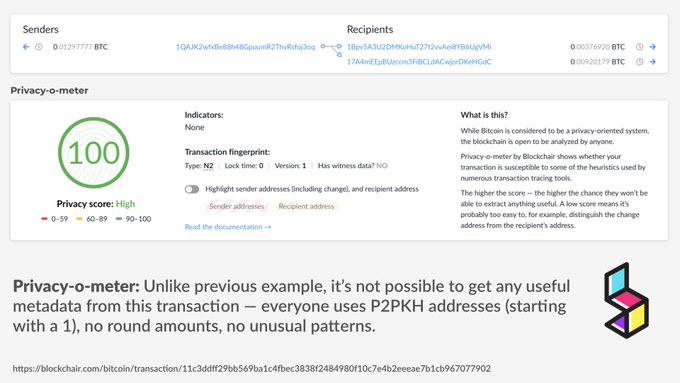Brett Rickaby's Insightful Corner
Exploring the world through news, tips, and intriguing stories.
Bitcoin's Secret Life: Unpacking Transaction Privacy Like Never Before
Discover the hidden world of Bitcoin privacy! Explore how transactions stay confidential and what it means for your digital assets. Don't miss out!
Understanding Bitcoin Transaction Privacy: What You Need to Know
Understanding Bitcoin transaction privacy is crucial for anyone involved in the cryptocurrency space. Unlike traditional financial systems, Bitcoin operates on a public ledger known as the blockchain, which means that every transaction is recorded and visible to anyone. This transparency can lead to privacy concerns, as users' wallet addresses and transaction histories can potentially be linked back to their identities. To enhance transaction privacy, users can implement specific strategies such as utilizing privacy-focused wallets, employing mixing services, or conducting transactions on protocols designed for anonymity.
Furthermore, it's essential to recognize the evolving landscape of Bitcoin and privacy regulations. As governments worldwide begin to scrutinize cryptocurrency transactions more closely, maintaining Bitcoin transaction privacy may not only be a matter of personal security but also of compliance. Educational resources and ongoing discussions about privacy technologies, such as CoinJoin and Lightning Network, are vital for users who wish to protect their financial information while still engaging in the benefits that Bitcoin has to offer.

Counter-Strike is a highly competitive first-person shooter game that has captivated players since its inception. Teams of terrorists and counter-terrorists face off in various game modes, showcasing strategy and skill. For those looking to enhance their gaming experience, don't forget to check out the cloudbet promo code for some exciting bonuses.
How Does Bitcoin Obfuscate Your Transactions? A Deep Dive
Bitcoin transactions are often viewed as pseudonymous, where users are identified by alphanumeric addresses rather than personal details. This level of anonymity is primarily achieved through the structure of the Bitcoin network, where all transactions are recorded on a public ledger known as the blockchain. However, the true extent of obfuscation is influenced by various factors, including the use of wallets, transaction mixing services, and the techniques leveraged by individuals to enhance their privacy. For instance, users may employ coin mixing, a process that blends their funds with others to obscure the transaction trail, making it challenging for anyone to trace the origin of specific bitcoins.
Despite these measures, it's important to note that transactions on the Bitcoin network are still publicly visible, meaning they can be analyzed through blockchain explorers. Analysts use sophisticated tools and algorithms to monitor transaction patterns and cluster addresses, potentially exposing the identities behind the wallets. Moreover, correlations between transactions and users' real-world activities can diminish the perceived anonymity of Bitcoin. To mitigate these risks, users are encouraged to adopt best practices, such as regularly changing their wallet addresses and utilizing privacy-focused cryptocurrencies that enhance anonymity beyond what Bitcoin offers.
Are Bitcoin Transactions Truly Anonymous? Debunking the Myths
Many people believe that Bitcoin transactions offer complete anonymity, leading to the myth that users can operate without any scrutiny. In reality, while Bitcoin transactions do not directly link to personal identities, they are recorded on a public ledger known as the blockchain. This means that every transaction is observable, and with advanced data analysis techniques, it is possible to trace transactions back to individuals through their wallet addresses. Moreover, services that convert Bitcoin to fiat currency often require identity verification, further complicating the notion of anonymity.
Another misconception is that using Bitcoin mixing services guarantees privacy. While these services attempt to obfuscate the transaction trail by mixing coins from various users, they do not provide foolproof anonymity. Law enforcement and blockchain analysis firms have developed sophisticated methods to track these mixed coins back to original wallets, undermining the perceived security. Therefore, it is crucial for users to understand that Bitcoin transactions are not as anonymous as they might believe, and they should take steps to protect their privacy while engaging with cryptocurrencies.